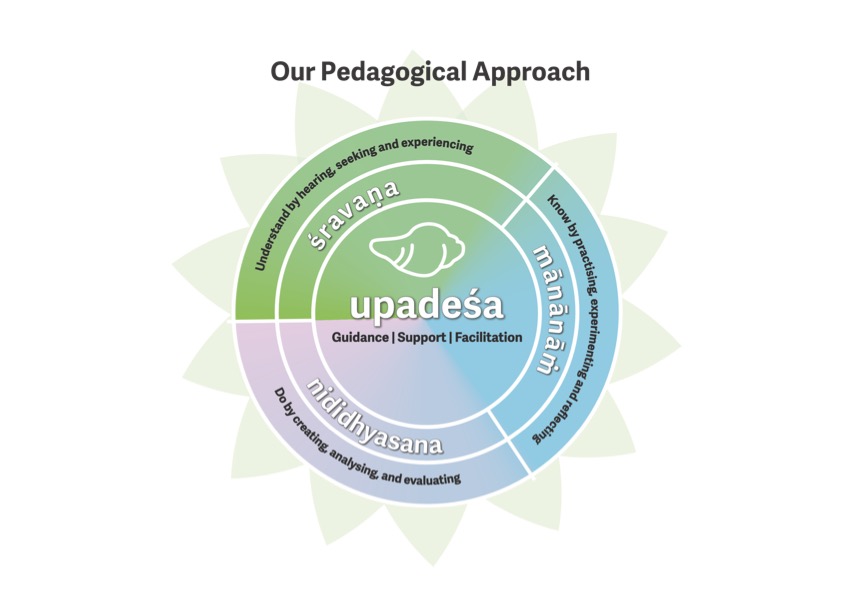At the Hare Krishna School our pedagogical approach lies at the heart of our teaching and learning process. The illustration below presents the four main elements of our approach which can be explained as follows:
Upadesa – the relationship between the teacher and the student which guides, supports, and facilitates the learing process.
Sravana – understanding by hearing, inquiring, and experiencing
Mananam – know by practising experimenting and reflecting
Nididhyasanam – do by creating, analysing, and evaluating

About our Curriculum
Our school’s curriculum offers a diverse and enriching education that combines the New Zealand Curriculum with teachings from our Krishna Bhakti Sastra Curriculum. We believe in providing a well-rounded experience for our students, which includes not only academic learning but also spiritual development through activities such as temple visits, yoga, meditation, and Sanskrit studies.
Our goal is to challenge every child while ensuring that they have memorable and meaningful learning experiences. We achieve this through careful planning, tailored teaching methods, and a focus on creativity and high-quality instruction.
If you’d like to learn more about our curriculum at Hare Krishna School, please don’t hesitate to get in touch with us. You can contact us using the information provided on our contact page, or you’re welcome to drop by and speak with our school office staff who are here to assist you with any questions you may have.
Sastra
In Sastra, students develop a spiritual perspective of their world. They learn to distinguish between matter and spirit and to explore the possibilities of living in harmony with nature through cooperating with the laws of God.
English
In English, students study, use and enjoy language and literature communicated orally visually or in writing.
The Arts
In The Arts, students explore, refine, and communicate ideas as they connect thinking, imagination, senses, and feelings to create works and respond to the works of others.
Health and Physical Education
In Health and Physical Education, students learn about their own well-being, and that of others and society, in health-related and movement contexts.
Languages
In learning Languages, students learn to communicate in Sanskrit, develop their capacity to learn further languages, and explore the Vedic worldview in relation to living and learning in society.
Mathematics and Statistics
In Mathematics and Statistics, students explore relationships in quantities, space, and data and learn to express these relationships in ways that help them make sense of the world around them.
Science
In Science, students explore how both the natural physical world and science itself work so that they can participate as critical, informed, and responsible citizens in a society in which science plays a significant role.
Techology
In Technology, students learn to be innovative developers of products and systems and discerning consumers who will make a difference in the world.
Social Sciences
In the Social Sciences, students explore how societies work and how they themselves will participate and take actions as critical, informed and responsible citizens.


